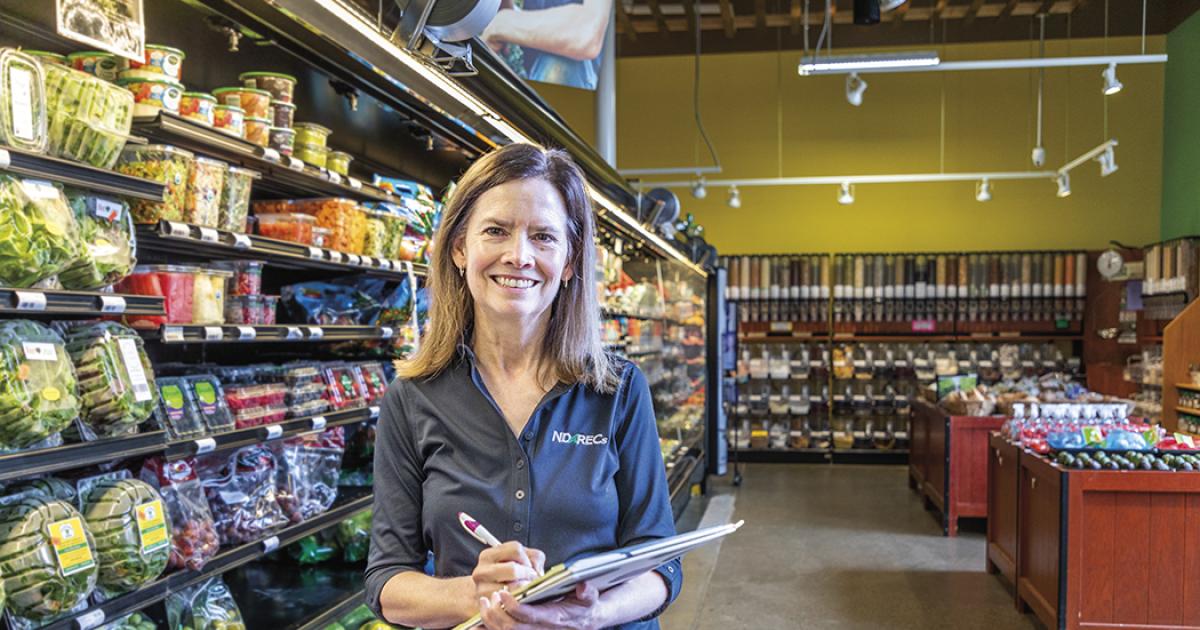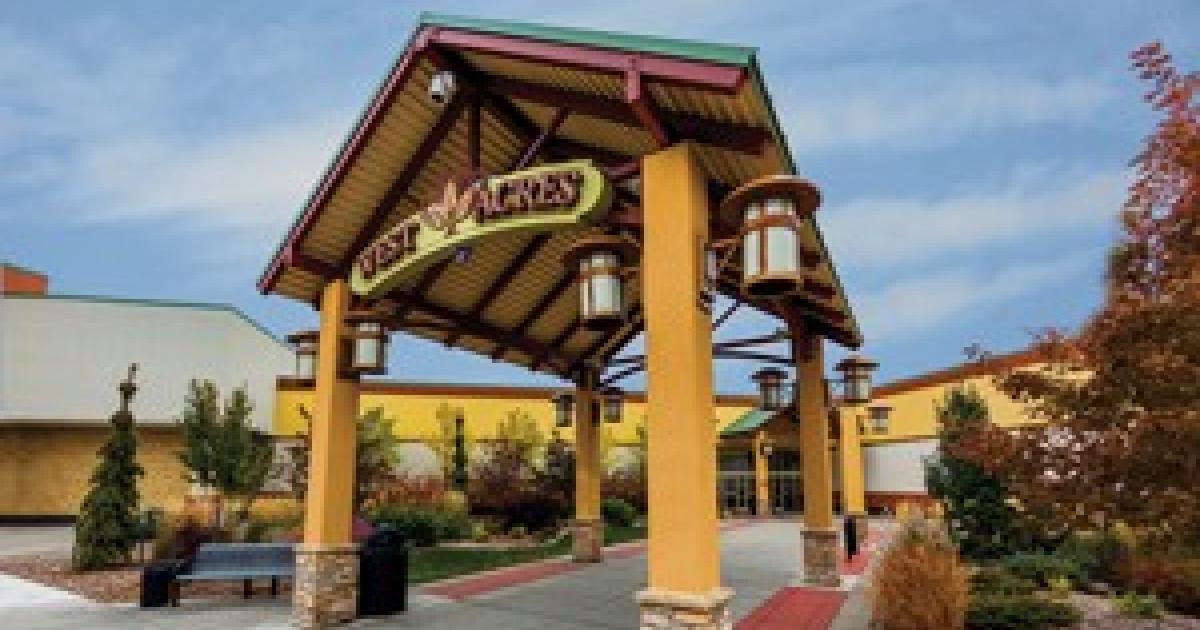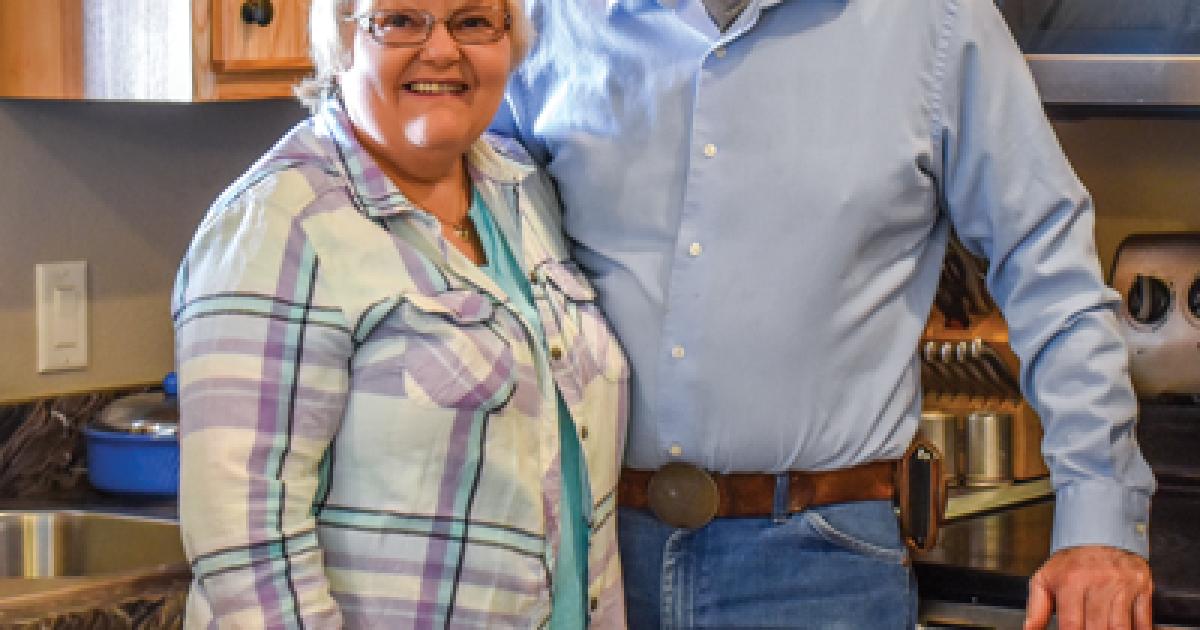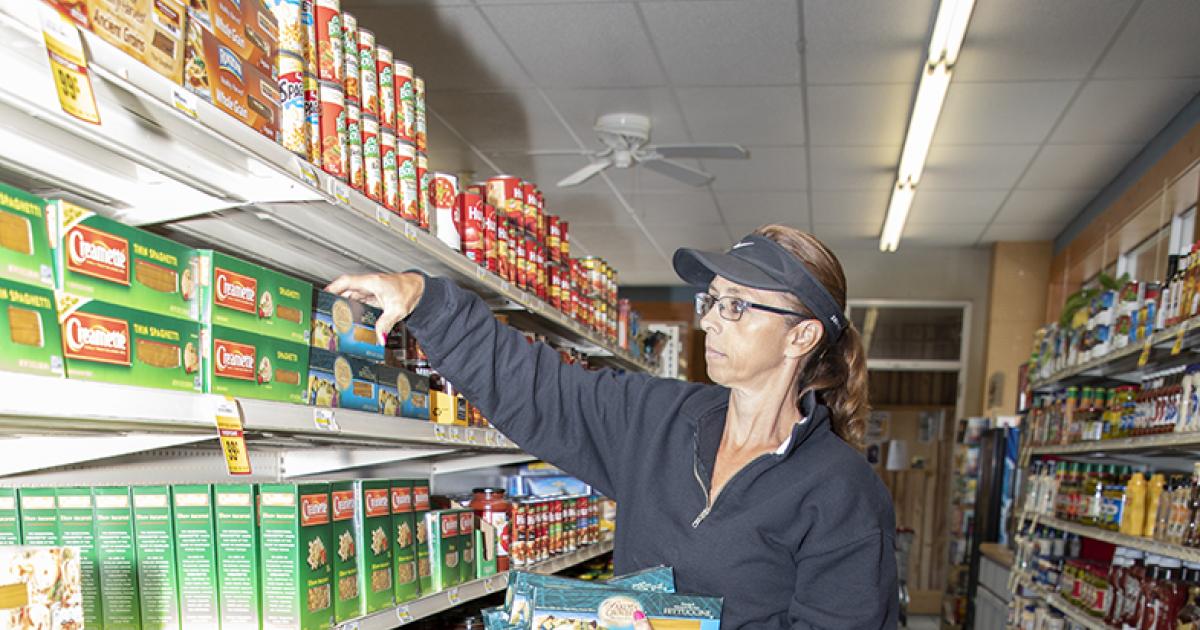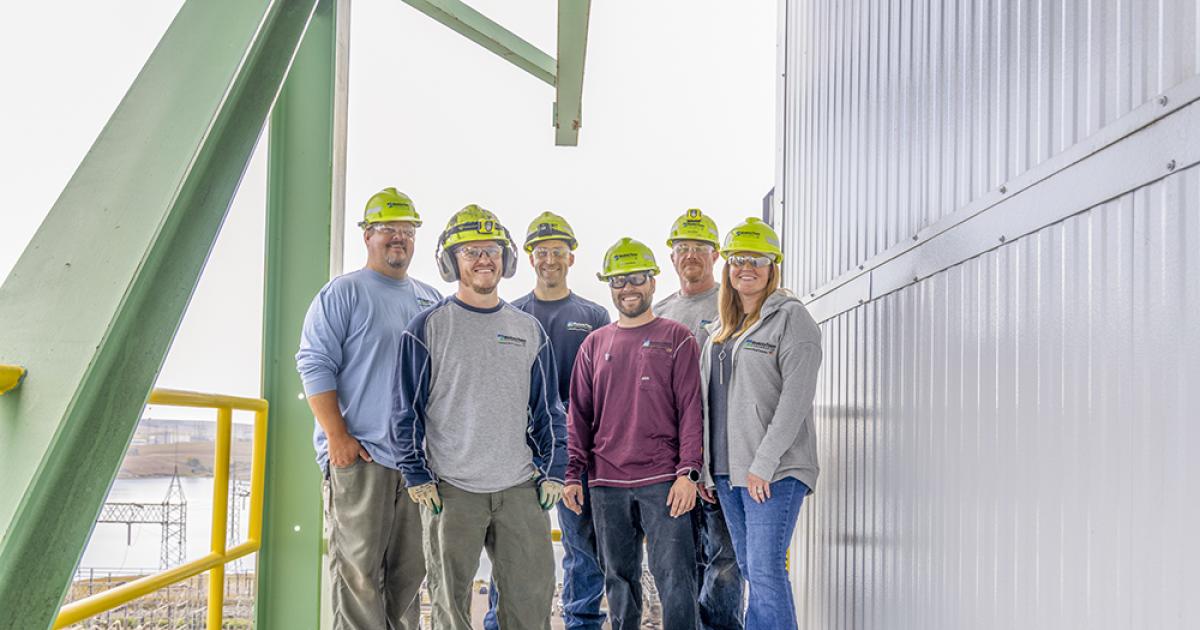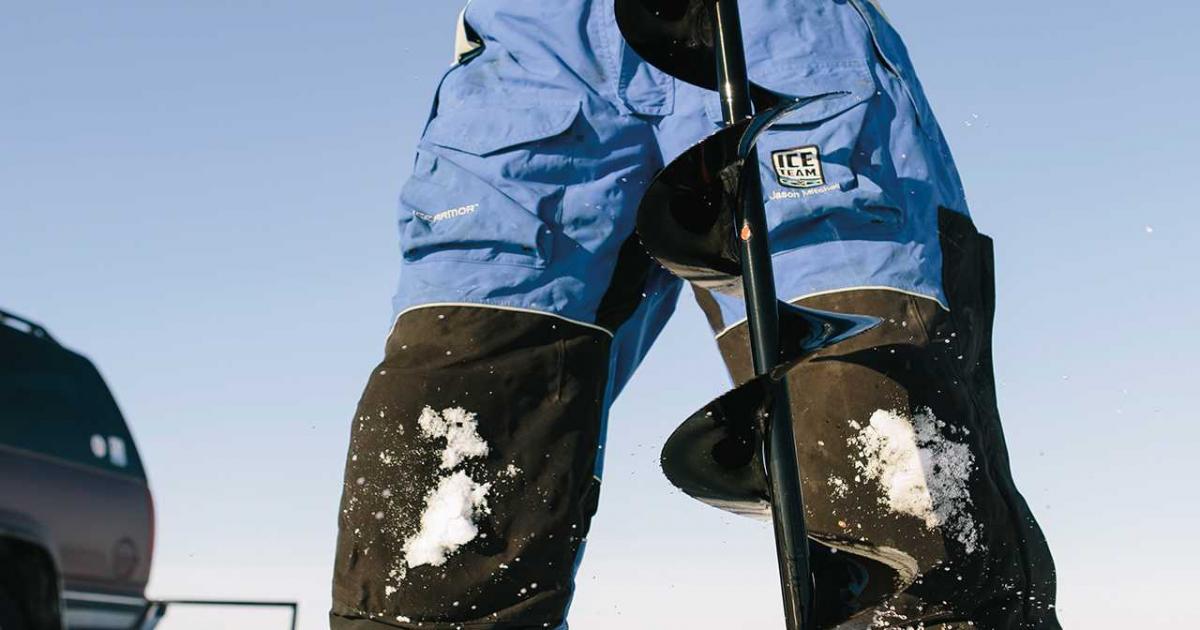The rural development champion who could
A hallmark of Lori Capouch’s more than 30-year career in rural development has been her work to improve rural food access and distribution and maintain the viability of rural groceries. Photo by NDAREC/Liza Kessel
“I don’t know that we could have did it without her,” says Corey Hart, a Bowdon area rancher who in 2010 desired to have a local meat processing facility in his community.
Many wouldn’t have thought it could be done. Period.
Bowdon’s population was 127 in 2010. The project faced challenges. A lack of people and capital, but not a lack of heart.
If the community of Bowdon wanted it bad enough, Lori Capouch was willing to try.
“She was a really good, good resource for us in that whole project,” Hart says of Capouch, who leads the Rural Electric and Telecommunications Cooperative Development Center (RE&T). “She always had a smile or a laugh, even if things weren’t going good.”
From the beginning, a handful of community members wanted a meat processing facility. In the end, it was an entire community that could make it happen. The Bowdon Meat Processing Cooperative opened in 2014, and Bowdon proved it was the little community that could – with a little help from the rural development champion who could.
SHE IS THE PERSISTENCE
If you have any connection to rural development in North Dakota, chances are you know (or have wondered how to pronounce) her name (SAP-oh).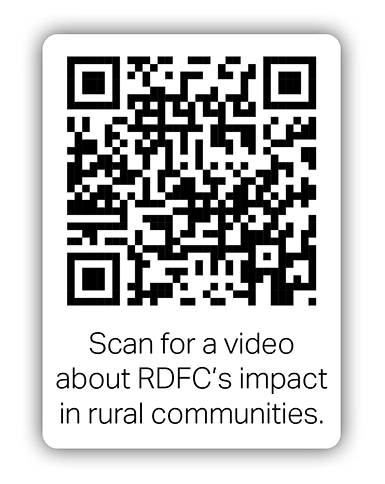 Capouch retires July 1 after more than 30 years in rural economic development. She started with the North Dakota Association of Rural Electric Cooperatives (NDAREC) in 1998 and was promoted to rural development director in 2006. Her career has taken her to every pocket of the state, from the most remote and rural communities to the largest. She has provided cooperative, business and economic development assistance to countless communities, organizations, co-ops, entrepreneurs, farmers and ranchers, grocery store owners and busy moms.
Capouch retires July 1 after more than 30 years in rural economic development. She started with the North Dakota Association of Rural Electric Cooperatives (NDAREC) in 1998 and was promoted to rural development director in 2006. Her career has taken her to every pocket of the state, from the most remote and rural communities to the largest. She has provided cooperative, business and economic development assistance to countless communities, organizations, co-ops, entrepreneurs, farmers and ranchers, grocery store owners and busy moms.
“You don’t ever get to work with the same people. You typically aren’t working on the same topic. You go from a meat plant to a child care to a grocery store to a bakery. They’re all different, between the people being different, the assets being different, even location matters,” she says.
Her work is made possible through an annual grant from the U.S. Department of Agriculture Rural Development and supported by NDAREC, the Broadband Association of North Dakota, and electric and telecommunications cooperatives in the state. The RE&T Cooperative Development Center provides services to enhance quality of life in rural North Dakota. Through the center, Capouch and her team are the rural development experts who connect North Dakotans with programs, tools, funds or assistance.
“That’s what we’re paid for, we don’t expect people to know (about rural development resources or how to access them). We come in and work with them through their project and we connect them to the appropriate programs. We help them write the applications,” Capouch says. “The layperson, it’s just enough to want to build a new business. (We help) figure the rest out.”
“Honestly, the whole job is we’re the persistence. If you wanted to form a child care, because you’re a young mom working full time and need day care, we’re the ones that say, ‘OK, time to meet!’ And we get the time set up and we get you together and we’ll take your minutes. We’ll do all that stuff in-between that you don’t have time to do,” Capouch says. “You’ll do some of it, but we’re the ones who will say, ‘It’s time to meet again.’”
Though she couldn’t tell you the number of grants she’s written in her career – in the hundreds – she’s worked on 145 projects alone with the Rural Development Finance Corporation (RDFC), a 501(c)4 formed by North Dakota electric and telecommunications cooperatives 30 years ago. RDFC has a $9 million revolving loan fund to help North Dakota communities with 10,000 or less people.
Rural groceries, food access, child care and meat processing have become her “bread and butter.” Her favorite projects have developed from the little communities that could.
“When you have a fairly small town and a group of people really want something, and so they’re willing to work for it. They’re not going to (make money) at all from it. They’re not even going to operate it, but they want it. Like a small-town grocery store you bring together, or a child care or a meat plant. It almost brings tears to your eyes when you break escrow and you say, ‘OK, we’re going to build this thing!’” she says. “Those are my favorite. It’s like you build new colleagues and friends to work with it.”
Out of all the projects she’s assisted, the success of the Rural Access Distribution (RAD) Cooperative in Walsh County is her proudest. It is the culmination of her decade-long work studying and documenting an alarming trend – the shuttering of rural grocery stores.
In 2014, 137 grocery stores were operating in North Dakota communities of 2,100 people or less. By August 2019, there were only 98 rural groceries left. North Dakota was quickly becoming one large food desert.
A possible solution? A shared services cooperative, with grocery stores cooperatively purchasing products to increase volume and reduce wholesale price, and a redistribution hub, to distribute the product and bring food access to towns without a grocery store.
And it worked. The RAD Cooperative is the first-known rural food access and distribution co-op in the United States. It involves five communities in northeastern North Dakota – Park River (Capouch’s hometown), Hoople, Edinberg, Adams and Fordville – working together.
“It was the first time I worked with a region, working together, and it was very risky. It took on the issue of distribution at a time when nobody else was,” Capouch says. “A few of us were called crazy, that it just would not work, that we couldn’t change a system that we weren’t involved in. And we just tried anyhow, and we could – we could change a system.”
“That one was fun,” she says, “just because we hit on an issue and we dared try something different. And I was old enough to not care what people thought of me. There’s power in that, too, honestly!”
RAD Cooperative Vice President Diana Hahn says it wouldn’t have happened without Capouch.
“Without Lori’s help, there’s no way we could have ever done this. There’s no way rural grocery stores could have done something like this, without Lori behind the scenes helping us,” Hahn says.
Capouch’s team is currently working to replicate the project with several communities in Emmons County and recently partnered with South Dakota to develop its own redistribution hub. It is also being replicated in an inner-city manner in the Bronx, N.Y., and to some degree in rural Kansas. The state Legislature appropriated $1 million last year to start a rural grocery store sustainability and food access expansion pilot grant program, and the Nebraska Legislature approved funding using the North Dakota model. The Illinois governor’s office requested a meeting with Capouch in May.
“Her ideas, her insight and outside-of-the-box thinking was really the push to get this whole thing going,” Hahn says. “How she helped us out in this corner of the state and those small communities, how she helped us as grocery stores be more viable. She’s made a huge impact.”
THE WORK WILL CONTINUE
In Capouch’s universe, “success is saying goodbye.” Her work is done when she is no longer needed. When Capouch takes her leave from a project or community, it is a signal of rural success.
Like in Bowdon, where she helped the community establish its meat processing cooperative. Or in Hazen, where she helped the community realize a child care cooperative in 2017 to meet a desperate local child care need for working families.
If success is saying goodbye, the timing of Capouch’s impending retirement is melancholily fitting. There’s great success to build on. The projects have momentum. Rural people have the energy. Everyone is paying attention.
“You work hard your whole career to gain that respect, and I feel like I just finally got there,” Capouch says. “It’s hard to step away.”
The only thing harder is seeing her go.
“You can’t force people to have your same passions, but you hope that some of the things you started continue,” she says. “The work isn’t done. It’s hard to step back, but there are people out there interested in the work, so it will continue.”
___
Cally Peterson is editor of North Dakota Living. She can be reached at cpeterson@ndarec.com.
___
 30 YEARS OF RDFC
30 YEARS OF RDFC
Started in 1994 as a small, nonprofit development corporation, the Rural Development Finance Corporation (RDFC) was incorporated by a few North Dakota electric and telecommunications cooperatives with a desire to invest in rural communities. Each cooperative provided $2,000 plus a $34,000 grant became RDFC’s starting capital to establish this rural investment fund. The money sat unused for more than 10 years.
In 2006, RDFC joined forces with a South Dakota nonprofit, Dakota Resources, to form Dakotas America, in an effort to access New Market Tax Credits through the U.S. Treasury. Dakotas America now places these tax credits nationally in economically distressed census tracks.
North Dakota co-ops, though Dakotas America and the New Market Tax Credits, have expanded broadband in Alaskan villages, formed an intergenerational campus in east Omaha, Neb., for at-risk children and brought a dental co-op to Washington state for homeless and low-income people.
“They’ve done some amazing things with that money. The co-op impact is huge,” says Lori Capouch, rural development director for the North Dakota Association of Rural Electric Cooperatives.
RDFC also receives fee income from placing these tax credits. The board has used this income to build a $9 million revolving loan fund to help North Dakota communities with 10,000 or less people.
RDFC has become an important key lending partner – offering low-interest financing and taking on more risk than a traditional lender – for rural people and communities to improve the quality of life in rural North Dakota. It has been able to offer affordable, subordinated gap financing for small meat plants, food processing, grocery stores, child care facilities, community infrastructure and small rural businesses.
“We’re taking a risk, because we really want you to have that fire truck or fire hall or whatever it is,” Capouch says.
Over 30 years, RDFC’s portfolio has grown to 145 loans.
North Dakota electric and telecommunications cooperatives through RDFC have demonstrated the value of cooperation and how the cooperative model effectively serves rural places. By pooling modest capital, through innovation and cooperation, RDFC will continue to invest in rural communities.
___
LORI’S LESSONS
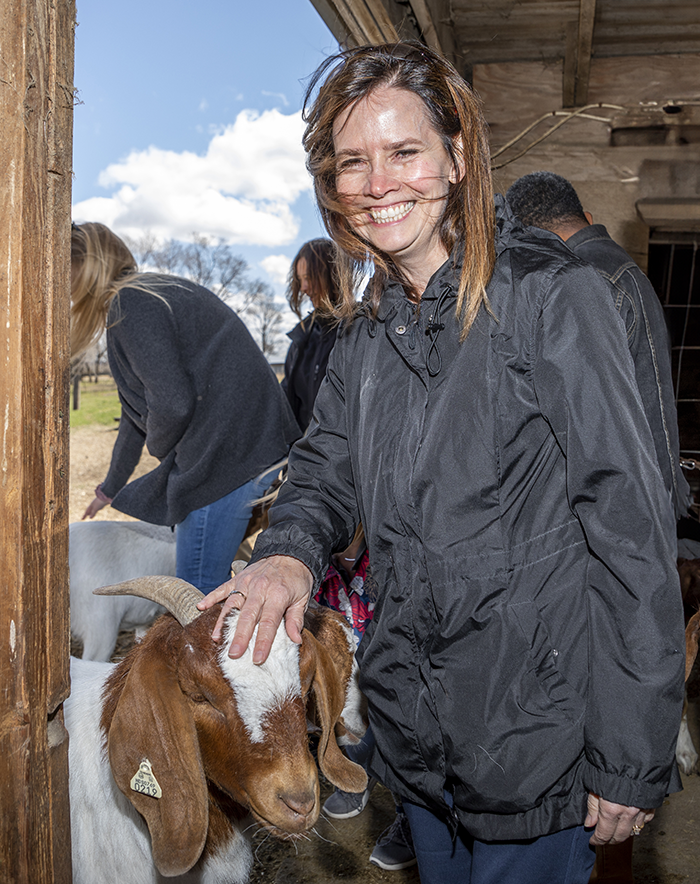 What is your dream for your rural community? Do you want something in your small town?
What is your dream for your rural community? Do you want something in your small town?
“Don’t be afraid,” encourages Lori Capouch, who’s worked in rural development for more than 30 years. “Go ahead and just step into that space and work as a team and contribute what you can. Every little hand helps.”
And learn from her own successes and failures, all of which provided these important lessons:
• Find the risktakers.
Only 3% of the population are risktakers. Sometimes, it’s like finding a needle in a haystack.
“There aren’t many of them, but you can recognize them. And then I just buddy up,” Capouch says with a laugh. “If that risktaker has the respect of their community and they want to say out loud they’re going to try something new, then people are like, ‘Oh! Maybe I should listen to that.’ Or, ‘Maybe I want to be a part of that.’”
• Letting go of an idea can make it better.
“I wish that I would have relaxed more and just trusted that it would become obvious what to do next,” Capouch says. “I spent a lot of time worrying that I needed to know all the steps to get us to the end, when in reality it’s not possible.”
There are no cookie-cutter or one-size-fits-all approaches, and communities have personalities.
“People will make decisions. And because you’re empowering people to make decisions, they’re going to decide different ways (to do things) than what you thought,” she says.
• The free market has trouble serving frontier places.
What works in other rural places won’t necessarily work in North Dakota.
“That took me, oh, I don’t know, over half my career to figure out,” Capouch says. “We need to work differently in North Dakota. It’s just realizing we’re more frontier (seven or less people per square mile) than rural, which just means that we’re more spread out with smaller towns and larger distances in-between, where it’s harder to get access to basic services.”
• We have donation fatigue.
Donations alone can’t sustain community services or projects, especially in rural areas.
“We found things that work, like the cooperative model, foundation grants, private donations and our revolving loan fund. Those things work because they’re flexible,” Capouch says. “They allow progress to happen in a manner that best suits the community within their timeline.”
• Find YOUR voice.
If you want something in your community, participation is the first step to making it happen. Engage, find people to help and work together.
“I think there is a lot of power in working together, and we’re just starting to learn in our state the value of working regionally, instead of city by city. And that we can do a lot regionally. We can bring a lot to our towns. … If we work together, we can do more,” she says.


